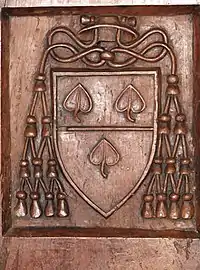Berardo Eroli
Berardo Eroli (1409–1479) (called the Cardinal of Spoleto) was an Italian Roman Catholic bishop and cardinal.

Biography
Berardo Eroli was born in Narni in 1409.[1] He was from an otherwise obscure family.[1] He studied at Rome, becoming a doctor of both laws.[1]
He was made a Referendary by Pope Nicholas V, who admitted him to the Apostolic Palace.[1] Nicholas later made him auditor of the Roman Rota.[1]
He was elected Bishop of Spoleto on November 13, 1448.[1] He served as Vicar of Rome during the pontificates of Pope Nicholas V and Pope Callixtus III.[1] He later became a regent of the Apostolic Chancellery.[1]
In the consistory celebrated in Siena on March 5, 1460, Pope Pius II made him a cardinal priest.[1] He received the red hat on March 8, 1460 and the titular church of Santa Sabina on March 19, 1460.[1]
He was appointed legate a latere to Perugia, leaving for the city on August 27, 1462.[1] He rejoined Pope Pius II at Terni in June 1464 and accompanied the pope to Ancona.[1] He did not participate in the papal conclave of 1464 that elected Pope Paul II.[1]
In August 1465, Eroli, along with Cardinals Basilios Bessarion and Juan Carvajal was part of a commission sent to the Kingdom of Bohemia to regulate its affairs.[1]
On January 3, 1466, he was elected Camerlengo of the Sacred College of Cardinals.[1] He was reelected to a second term on January 24, 1467.[1]
He participated in the papal conclave of 1471 that elected Pope Sixtus IV.[1] He opted to become a cardinal bishop, receiving the suburbicarian see of Sabina on May 23, 1474.[1] He again served as Vicar of Rome in 1475.[1]
He died in Rome on April 2, 1479.[1] He is buried in St. Peter's Basilica.[1]
References
| Wikimedia Commons has media related to Berardo Eroli. |
- Miranda, Salvador. "EROLI, Berardo (1409-1479)". The Cardinals of the Holy Roman Church. Florida International University.
| Catholic Church titles | ||
|---|---|---|
| Preceded by Guillaume d'Estouteville |
Camerlengo of the Sacred College of Cardinals 1466 |
Succeeded by Basilios Bessarion |
| Preceded by Guillaume d'Estouteville |
Camerlengo of the Sacred College of Cardinals 1474 |
Succeeded by Bartolomeo Roverella |